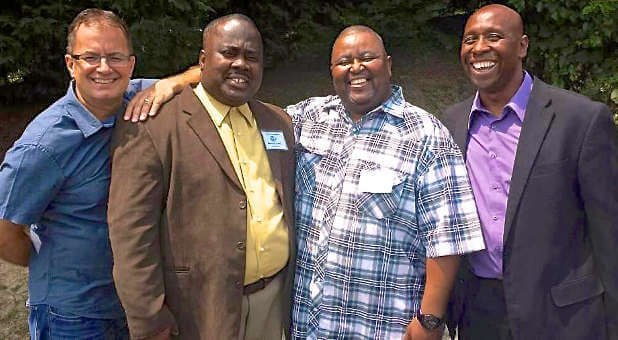On August 9—the day Michael Brown was killed in Ferguson, Missouri—I was speaking in a church in Edgewood, Maryland, near Baltimore, and spending time with three African-American friends who are pastors. One of the guys, Lewis, knew I loved Southern cooking, so he mentioned this to Lester, the pastor who was hosting the conference. Lester made a phone call—and we all ended up enjoying fried catfish and collard greens together.
I was in soul food heaven—until I heard what happened in Ferguson. Brown, an unarmed black teenager, had been shot by a white police officer at 12:01 p.m. that Saturday, just minutes before I began eating lunch with my friends in Maryland.
We all know what happened next. Two cops were injured in street disturbances in Ferguson. More police were dispatched to the scene—armed with rifles, rubber bullets and tear gas. Protesters who believe Brown was a victim of racial profiling held their hands in the air and shouted, “Hands up, don’t shoot!” Those words became the official motto of the Ferguson tragedy.
It’s been almost three weeks since the shooting. President Obama urged everyone to stay calm. The protests became more peaceful. Federal authorities are investigating. But at Brown’s funeral on August 25, held at Friendly Temple Missionary Baptist Church in St. Louis, distraught mourners were still asking many questions.
Why did the policeman shoot Brown six times? Why does Ferguson only have three black police officers on its force, compared to 53 white officers, when that community is 71 percent black? Why did the police have to roll into Ferguson in armored tanks as if they were invading Afghanistan?
We are bitterly divided into camps now. Some people side with the police, while others sympathize with Brown’s family and wonder if their own black sons are safe on the streets. But there are also many Americans—including many white Christians—who sit on the suburban sidelines of this bitter fight. We don’t know what to say, so we say nothing.
I don’t live in St. Louis, and I don’t have all the facts in this complicated case. But I understand why many African-Americans are upset about what happened in Ferguson. They know racism firsthand. They have been pulled over by cops for simply being black. They don’t feel safe. And they don’t feel they are treated fairly in a country that claims to stand for truth and justice.
I asked my African-American pastor friends from Maryland to share their experiences with racism. Each man had his story.
Paul Carrette, pastor of Church of Living Waters in Oxon Hill, drove into a neighborhood in the city of Annapolis to visit one of his parishioners a few years ago. Two cops pulled him over. Paul’s crime: He was guilty of “a DWB,” otherwise known as “Driving While Black.” The officers claimed Paul’s windows were tinted too dark—but when he told them where he bought the car they walked away.
Lewis Lee, pastor of LS Revival Center in White Marsh, was traumatized at age 12 when he visited a sandwich shop with a black friend. A group of white men began to make racist comments, comparing blacks to monkeys. The men also made jokes about lynching. “Can you imagine the fear we felt when surrounded by a group of white men who were staring at us?” Lewis asks.
Lester Lee, pastor of Fruitful Living Christian Center in Edgewood, said he experienced racism recently, when he was looking at some property. When the seller realized Lester was black, he shiftily announced that the property was no longer on the market—even though it had been on the market earlier that day and was back on the market a day later. “I would have expected that kind of behavior in the 1960s, but not today,” Lester says.
These men are Pentecostal pastors, and they don’t carry grudges. They have forgiven the people who disrespected them. And they’ve shown the highest level of brotherly love toward me.
But the Ferguson tragedy reminds me once again that we have so much unfinished business when it comes to healing our racial wounds. Things are not going to change until we face reality and have a conversation. I asked my friends what they feel must happen in order to address this hemorrhaging wound. I will quote all three:
Paul Carrette: “Whites must be willing to step out of their often segregated neighborhoods to engage African Americans. Be our friends, visit our churches, listen to our concerns and follow our journey as we struggle through a history of oppression and negative stereotypes to pursue our dreams.”
Lewis Lee: “I want my white brothers and sisters to understand what it’s like to be profiled. I want them to know what it’s like to be followed around in a store or stopped by police just because you are black. We need to come to the table to converse and pray together. We need to truly care for one another. We must stop the stereotypes.”
Lester Lee: “I don’t believe whites can fully understand unless they have walked in the shoes of those who have been mistreated. The black community must accept forgiveness from the white community, and the white community, especially Christians, must help by reaching out in love. Don’t look at the color of a person’s skin but the content of his character.”
The Apostle Paul wrote in Galatians 6:12: “Bear one another’s burdens, and so you will fulfill the law of Christ.” You can’t bear a friend’s burden without getting close to him. Let’s spend time with each other. Let’s talk, listen and pray together. Let’s try to feel each other’s pain. Only then can we heal the ugly wound that was opened in Ferguson.
J. Lee Grady is the former editor of Charisma. You can follow him on Twitter at leegrady. He is the author of 10 Lies Men Believe and other books. You can learn more about his ministry, The Mordecai Project, at themordecaiproject.org.











































